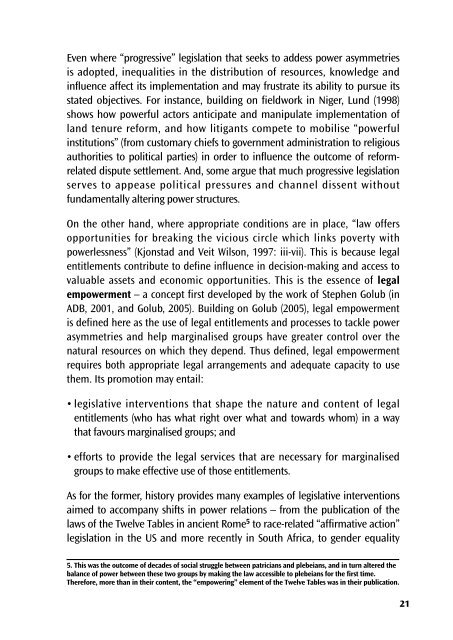Legal empowerment for local resource control
Legal empowerment for local resource control
Legal empowerment for local resource control
Create successful ePaper yourself
Turn your PDF publications into a flip-book with our unique Google optimized e-Paper software.
Even where “progressive” legislation that seeks to addess power asymmetries<br />
is adopted, inequalities in the distribution of <strong>resource</strong>s, knowledge and<br />
influence affect its implementation and may frustrate its ability to pursue its<br />
stated objectives. For instance, building on fieldwork in Niger, Lund (1998)<br />
shows how powerful actors anticipate and manipulate implementation of<br />
land tenure re<strong>for</strong>m, and how litigants compete to mobilise “powerful<br />
institutions” (from customary chiefs to government administration to religious<br />
authorities to political parties) in order to influence the outcome of re<strong>for</strong>mrelated<br />
dispute settlement. And, some argue that much progressive legislation<br />
serves to appease political pressures and channel dissent without<br />
fundamentally altering power structures.<br />
On the other hand, where appropriate conditions are in place, “law offers<br />
opportunities <strong>for</strong> breaking the vicious circle which links poverty with<br />
powerlessness” (Kjonstad and Veit Wilson, 1997: iii-vii). This is because legal<br />
entitlements contribute to define influence in decision-making and access to<br />
valuable assets and economic opportunities. This is the essence of legal<br />
<strong>empowerment</strong> – a concept first developed by the work of Stephen Golub (in<br />
ADB, 2001, and Golub, 2005). Building on Golub (2005), legal <strong>empowerment</strong><br />
is defined here as the use of legal entitlements and processes to tackle power<br />
asymmetries and help marginalised groups have greater <strong>control</strong> over the<br />
natural <strong>resource</strong>s on which they depend. Thus defined, legal <strong>empowerment</strong><br />
requires both appropriate legal arrangements and adequate capacity to use<br />
them. Its promotion may entail:<br />
legislative interventions that shape the nature and content of legal<br />
entitlements (who has what right over what and towards whom) in a way<br />
that favours marginalised groups; and<br />
ef<strong>for</strong>ts to provide the legal services that are necessary <strong>for</strong> marginalised<br />
groups to make effective use of those entitlements.<br />
As <strong>for</strong> the <strong>for</strong>mer, history provides many examples of legislative interventions<br />
aimed to accompany shifts in power relations – from the publication of the<br />
laws of the Twelve Tables in ancient Rome 5 to race-related “affirmative action”<br />
legislation in the US and more recently in South Africa, to gender equality<br />
5. This was the outcome of decades of social struggle between patricians and plebeians, and in turn altered the<br />
balance of power between these two groups by making the law accessible to plebeians <strong>for</strong> the first time.<br />
There<strong>for</strong>e, more than in their content, the “empowering” element of the Twelve Tables was in their publication.<br />
21

















